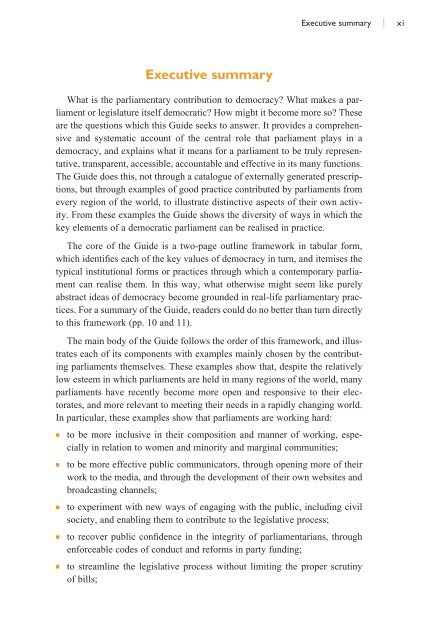PARLIAMENT AND DEMOCRACY - Inter-Parliamentary Union
PARLIAMENT AND DEMOCRACY - Inter-Parliamentary Union
PARLIAMENT AND DEMOCRACY - Inter-Parliamentary Union
You also want an ePaper? Increase the reach of your titles
YUMPU automatically turns print PDFs into web optimized ePapers that Google loves.
Executive summary<br />
Executive summary I xi<br />
What is the parliamentary contribution to democracy? What makes a parliament<br />
or legislature itself democratic? How might it become more so? These<br />
are the questions which this Guide seeks to answer. It provides a comprehensive<br />
and systematic account of the central role that parliament plays in a<br />
democracy, and explains what it means for a parliament to be truly representative,<br />
transparent, accessible, accountable and effective in its many functions.<br />
The Guide does this, not through a catalogue of externally generated prescriptions,<br />
but through examples of good practice contributed by parliaments from<br />
every region of the world, to illustrate distinctive aspects of their own activity.<br />
From these examples the Guide shows the diversity of ways in which the<br />
key elements of a democratic parliament can be realised in practice.<br />
The core of the Guide is a two-page outline framework in tabular form,<br />
which identifies each of the key values of democracy in turn, and itemises the<br />
typical institutional forms or practices through which a contemporary parliament<br />
can realise them. In this way, what otherwise might seem like purely<br />
abstract ideas of democracy become grounded in real-life parliamentary practices.<br />
For a summary of the Guide, readers could do no better than turn directly<br />
to this framework (pp. 10 and 11).<br />
The main body of the Guide follows the order of this framework, and illustrates<br />
each of its components with examples mainly chosen by the contributing<br />
parliaments themselves. These examples show that, despite the relatively<br />
low esteem in which parliaments are held in many regions of the world, many<br />
parliaments have recently become more open and responsive to their electorates,<br />
and more relevant to meeting their needs in a rapidly changing world.<br />
In particular, these examples show that parliaments are working hard:<br />
■ to be more inclusive in their composition and manner of working, especially<br />
in relation to women and minority and marginal communities;<br />
■ to be more effective public communicators, through opening more of their<br />
work to the media, and through the development of their own websites and<br />
broadcasting channels;<br />
■ to experiment with new ways of engaging with the public, including civil<br />
society, and enabling them to contribute to the legislative process;<br />
■ to recover public confidence in the integrity of parliamentarians, through<br />
enforceable codes of conduct and reforms in party funding;<br />
■ to streamline the legislative process without limiting the proper scrutiny<br />
of bills;

















